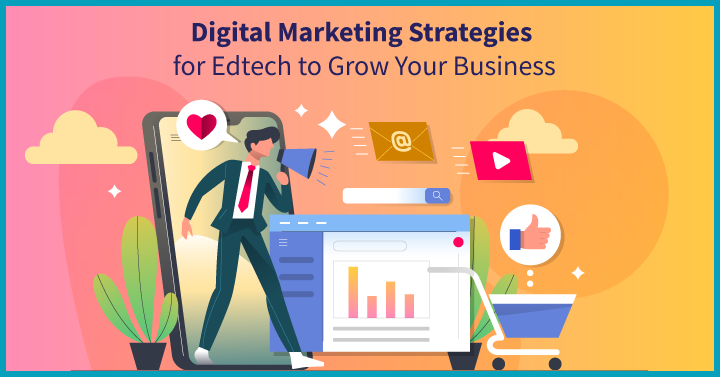With global edtech marketing growing massively over the years, it’s hard for companies to plan and execute their marketing strategies in a competitive zone. Since buyers spend considerable time in making a decision when it comes to purchasing an educational product, companies must create unique marketing strategies that appeal to them easily. There are several digital marketing tactics for edtech that can convince the audience and turn them into potential customers.
This guide will walk you through 15 easy-to-implement edtech marketing strategies to help your edtech increase brand awareness and achieve heights in no time.
1. What Is Edtech Marketing?
Edtech marketing uses digital strategies by edtech firms to achieve their business goals. Irrespective of the domain (B2B or B2C), it is imperative for edtech firms to work on digital marketing strategies in a reliable way to achieve result-oriented outcomes. One needs to implement the best marketing strategies and shift them according to the demands of the respective industry.
2. Benefits of Digital Marketing for Edtech Companies
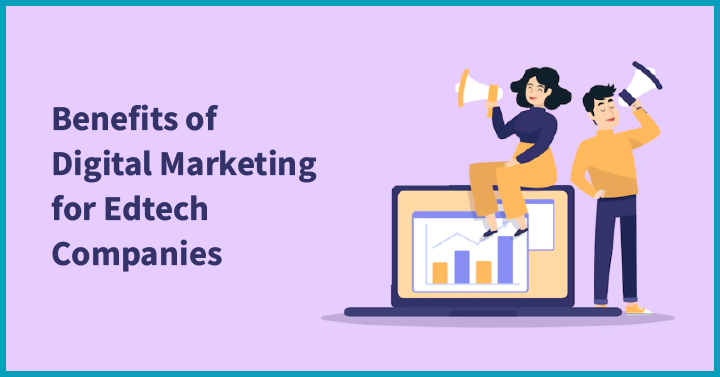
- Higher conversions
The most significant advantage of digital marketing for edtech is higher conversion than traditional marketing. With the proliferation of numerous social media platforms and online channels, edtech firms can now reach students on a large scale. For instance, edtech companies can boost their online visibility using a variety of banner ads, emails, videos, infographics, blog posts, articles, etc. All these have more significant potential to generate organic, high-quality traffic and drive huge conversions.
- Build credibility
Evolving as a successful brand is a must to establish credibility in your industry. You can build strong authority and online recognition using the best digital marketing tactics. As a result, your business will likely gain potential customers’ trust, eventually resulting in more sales. For instance, you can publish compelling content that showcases your domain expertise and knowledge.
- Cost-effective
Digital marketing for edtech outshines traditional marketing strategies, including – radio ads, tv ads, newspaper ads, flyers, brochures, and billboards. Digital strategies like – email, social media posts, website content, and videos cost you nearly nothing except time. Your Customer Acquisition Cost (CAC) is almost negligible when your customers come through any of these channels.
3. 15 Digital Marketing Strategies for Edtech to Grow Your Business
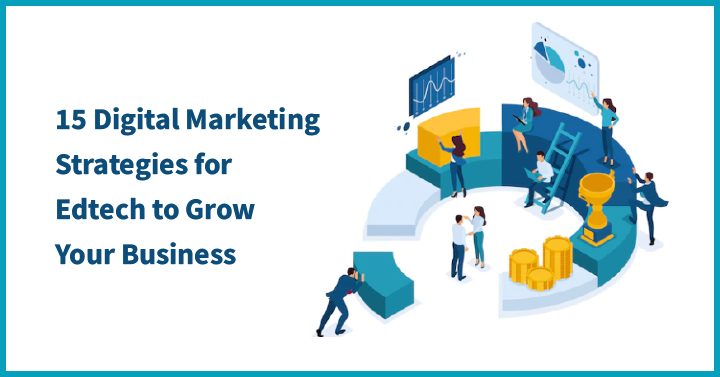
3.1 SEO for Edtech
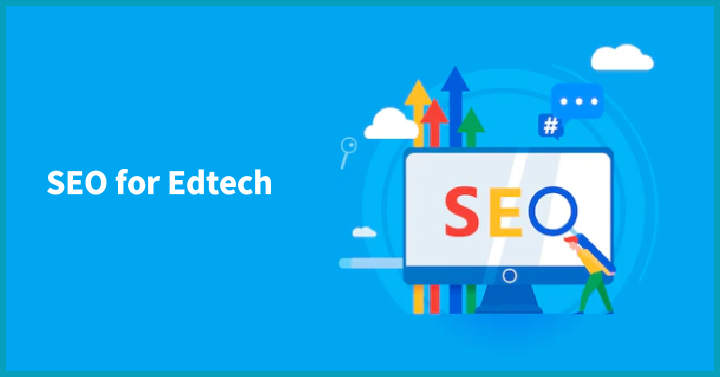
- On-Page SEO
On-page SEO for edtech refers to optimising the website to improve its ranking on search engines. It includes optimising the headlines, content, images, title, meta description, and header to help your website be discovered and ranked by Google.
Beyond helping search engines interpret the page content, it allows users to clearly understand what the page is about and know if the webpage is worthy of ranking.
The ultimate goal of on-page SEO can be to make it possible for users and search engines to identify if the webpage is relevant to the search query. You can supercharge the power of keywords to boost your on-page SEO efforts. Your keyword research should boil down to researching, choosing, and integrating keywords you can easily rank for.
- Off-Page SEO
Off-page SEO can be defined as actions outside the website that impact your rankings within SERPs. Link building is integral to off-page SEO, whose ultimate goal is to earn quality links from high Domain Authority (DA) sites.
If search engines see a lot of pages on your website for a particular search term and are not sure which one to rank higher, you’ll struggle to increase the rank no matter how much value you provide. In that case, your link-building strategy will help you dive to the shore. Once you gain credibility, your edtech brand will naturally earn mentions and links from across the web and reach your goals quickly.
- Technical SEO
Technical SEO for edtech is all about improving the technical aspects of a website to increase its chances of being crawled and indexed correctly. In addition, it involves optimising the website to help search engines like Google, Yahoo, and Bing find it easily. You might have created a feature-rich website for your edtech. However, if the search engines can’t index them correctly – all your efforts go in vain. So, it is essential to take care of technical aspects of your website, such as schema markup, site map, loading speed, mobile indexing, and SSL.
You can use website audit tools like – SEOptimer, SEMrush, SiteChecker, and Ahrefs to see all the technical issues with your website and take measures to fix them.
To read more about SEO for Edtech, read our full article here.
3.2 PPC Marketing for Edtech
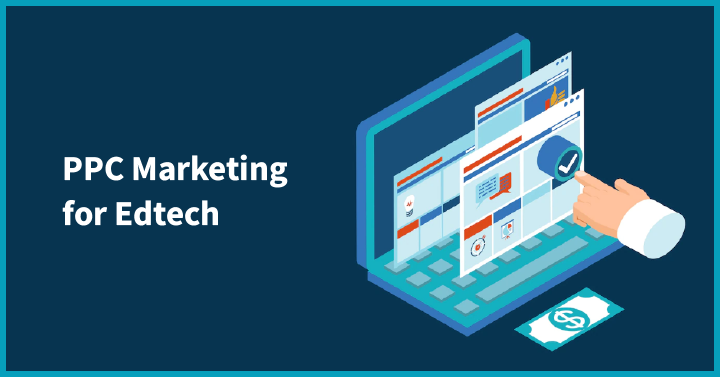
- Set Campaign Goals
PPC marketing for edtech, also known as paid advertising, is a model of digital marketing for edtech where the advertiser is charged when someone clicks on their ads. To implement successful PPC edtech campaigns, you must first understand your goals and strategise a plan to target the right audience.
Some examples of edtech campaign goals are –
- Gain website traffic by 300% in 6 months.
- Boost conversions by 75%.
- Generate $1 billion in revenue in 12 months, and so on.
Based on the goals of your edtech marketing campaigns, you can set up ads like – search ads, instream ads, retargeting, e-commerce ads, display ads, etc., that help engage your prospects and result in conversions.
- Target Right Audience
Targeting the right audience is the key to achieving success with PPC marketing. There are different types of audiences, such as – customer audiences, lookalike audiences, website visitors, custom affinity audiences, YouTube users, etc.
Based on your campaign goals, you need to target a specific group of consumers who will likely choose your product or services. Your target audience is often dictated by age, gender, income, location, interests, and other factors. You can use Google Analytics to know how your target audience interacts with your website.
- Unique Landing Pages
A PPC landing page is a standalone web page you intend to use in your paid advertising campaign. The users land on this page after they click a specific PPC ad on search engines. To get the most out of your edtech ad campaign, you should always redirect your visitors to an optimised landing page, not any random page.
When creating landing pages for your PPC campaign, always keep the keywords in mind to ensure the content is relevant. You can create multiple variations of landing pages and conduct A/B testing to increase the conversion rate by 200%.
To read more about PPC Marketing for Edtech, read our full article here.
3.3 Content Marketing for Edtech
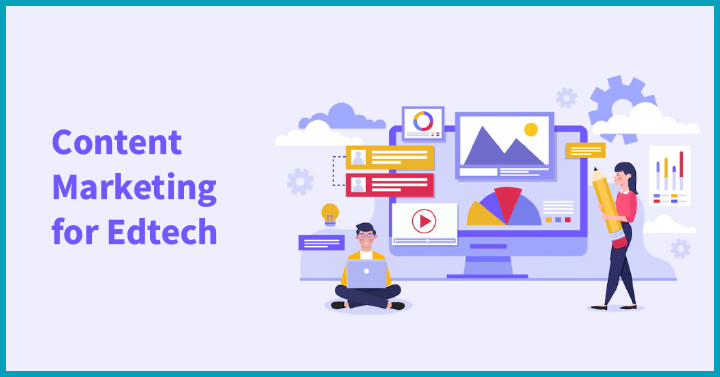
- Audit the Existing Content
Content marketing for edtech is not just about posting a large volume of content but resonating it with the customer journey at different stages. It is also about ensuring excellent quality of content and not only the quantity of content pieces you produce. Therefore, auditing existing content is essential to achieving your marketing goals.
To begin with, you can take an inventory of existing content, including articles, ebooks, case studies, external publications, and landing pages. Conduct keyword analysis to understand the current search trends and revamp the content with new keywords to gain a competitive advantage over your rivals. Also, it gives you an opportunity to rebrand and leads to better customer retention.
- Publish Keyword-Rich Content
Keywords play a vital role in content marketing for educational companies, as they help optimise the content for search engines and drive relevant traffic. Hundreds of edtech firms use keyword-rich articles to boost their visibility and get free exposure on the internet. By incorporating high search volume keywords in your content, you have higher chances of going in front of those who typed the exact phrases or keywords in Google’s search box.
As a general rule of thumb, Google looks for keywords in the introduction and conclusion with a keyword density of 1-2%. You can use tools like Google keyword Planner and SEMRush to find out what people are currently searching for. Also, infuse local keywords in the content so that your edtech firm is shown in local search results.
- Promote Content Across Distribution Channels for Edtech
Once you have a good number of articles or ebooks published, you must distribute them on different channels and platforms. You need a diversified plan in digital marketing for edtech to promote your content and reach a wider audience. Regarding edtech marketing, some popular platforms are – Tumblr, Reddit, Facebook, and Hubpages. You need to make an omnichannel presence for higher user engagement.
Besides, you can repurpose your content in forums, communities, niche groups, and community-building platforms such as – Wikispaces, Edmodo, and Edtech Hub. This will give your edtech good online exposure, eventually helping you drive more sales.
To read more about Content Marketing for Edtech, read our full article here.
3.4 Social Media Marketing for Edtech
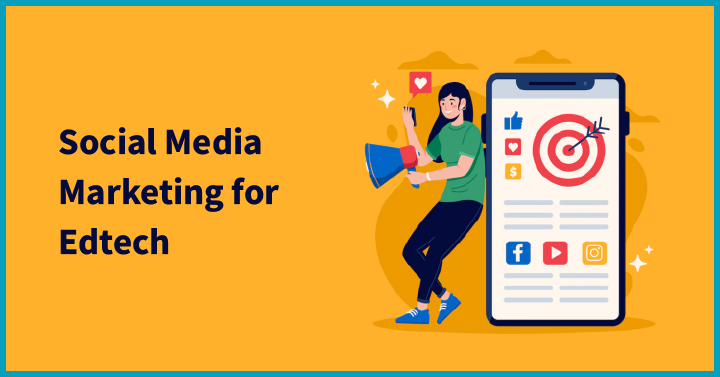
- Optimise Social Media Profiles
Social media marketing for edtech helps in reaching potential prospects and driving engagement. You need a well-designed social media page with a detailed about us section, cover image, logo, and CTA to gain traction. Also, you need to update the page with trending content regularly. According to Hubspot, 21% of customers are likely to unfollow the page if they see repetitive posts or content.
Branding and creative visuals will attract your primary target, millennials and the younger generation. An appropriate call-to-action and messages that match your current promotions will help you boost user engagement and turn them into potential customers.
- Invest in Hashtag Marketing
Hashtag marketing is an essential part of digital marketing for edtech. It gives your brand more exposure by increasing its reach and participation. With 4+ billion users on social media platforms like Facebook, Instagram, Twitter, and Pinterest, there is no better opportunity to connect with a broader audience. Brands can use relevant hashtags in their posts for better reach, more impressions, and higher engagement.
Hashtags will offer a convenient approach to reaching the right audience and incorporating relevant content into online conversations. To get involved in the right hashtag marketing strategy, you need to identify keywords based on the services or products you wish to promote. For instance, if you are into STEM education – you can use #learning, #STEM, #advancedlearning #technology, and related hashtags.
- Bring Influencers on Board
Influencer marketing is a type of social media marketing that involves using endorsements and product mentions from popular influencers (often individuals) or bloggers to promote your brand. Many edtech firms use influencer marketing to market their brand and engage the audience.
With millions of influencers on social media, you can tap into the power of influencer marketing to grow your edtech business. It is essential to realise that most influencers have built an enthusiastic audience who care about their opinions. Collaborating with influencers in your field or industry is advised for better visibility.
To read more about Social Media Marketing for Edtech, read our full article here.
3.5 Email Marketing for Edtech
- Personalise Emails
If done correctly, email marketing for edtech firms can help drive quality traffic and boost your SEO efforts. By creating personalised emails targeted to a specific group, you can have higher open rates and more click-through rates. In addition, it helps increase user engagement and improve your relationship with your customers.
Studies showed that emails with personalised tactics, such as using subscribers’ names, locations, or interests in the subject line, can have a measurable impact on the ROI. However, remember that the emails should have a clear purpose with more relevant offers and a positive communication experience.
- Design Responsive Emails
According to statistics, 70% of people read emails from mobile devices. You will likely miss out on a crucial audience by ignoring the mobile responsive feature. You might consider using mobile-responsive email templates customised as per the device.
For a better user experience, ensure the responsive template CSS media query produces multiple copies depending on the user’s screen. You can choose from a wide range of template designers, such as – Zurb, Emailonacid, and Colorlib
- Schedule Emails at Best Times
Email scheduling is another critical factor that determines the success of your campaign. You should choose the best time to send emails for higher click-through rates. As the saying goes, there is no one-size-fits-all; the schedule differs from industry to industry. The best time to send edtech emails is 10 am on Tuesday, Wednesday, and Thursday.
You can use email scheduling tools like Buffer, Constant Contact, Hootsuite, etc., to determine the best time to shoot your email marketing campaign. Try sending emails at different times of the week, depending on the recipient’s time zone.
To read more about Email Marketing for Edtech, read our full article here.
4. FAQS
- How Do I Market My Edtech Business?
There are several ways to market your edtech firms, such as digital marketing for edtech, email marketing, social media marketing, SEO, and content marketing.
- How Do I Promote My Edtech Platform?
You can promote your edtech brand using pay-per-click advertising, a popular paid marketing strategy. Google ads, Facebook ads, and Instagram ads are popular PPC tactics to promote your edtech.
- How Do Edtech Companies Generate Leads?
Edtech companies can generate qualified leads by investing their time and money in organic and paid searches.
Resources You Will Love
- The Ultimate Guide To PPC Marketing For Edtech To Grow Business In 2022
- 11 Powerful Strategies In Digital Marketing For Edtech To Promote Your Business
- Email Marketing For Edtech: 10 Tactics To Effectively Nurture Leads And Increase Conversions
- Ultimate Guide To SEO For EdTech: Boost Your Online Presence
About Growth Ganik
Growth Ganik is a rapidly evolving digital marketing agency in Sydney, Australia, specialising in SEO, content marketing, marketing strategy, and lead generation.
We work with clients from leading brands and industries such as B2B SaaS, nonprofits, and more to develop profitable digital marketing solutions that are data-driven to support all kinds of business goals – from widening user bases and gaining more traction for online engagement to increasing conversion and helping businesses scale up.
For creative tailor-made digital solutions and sustainable growth insights, get in touch with us!

